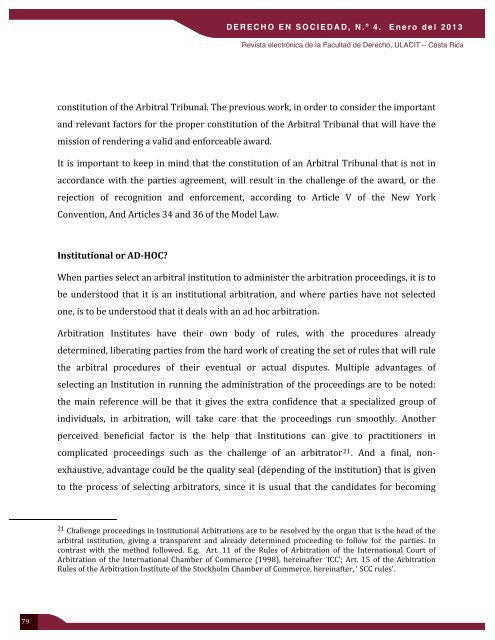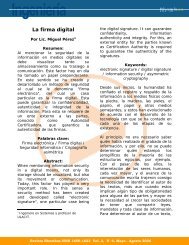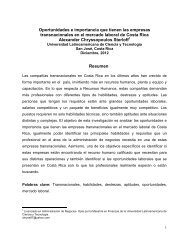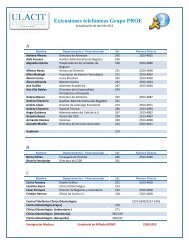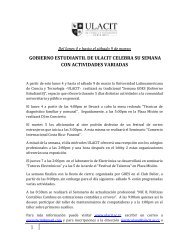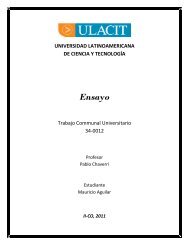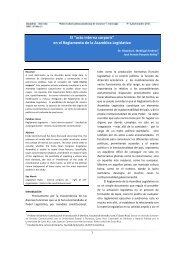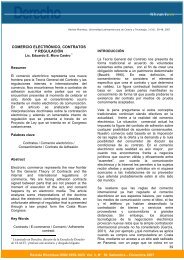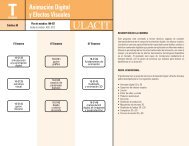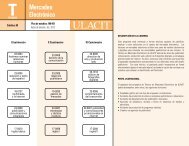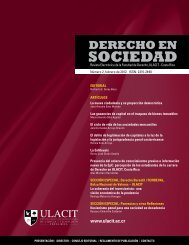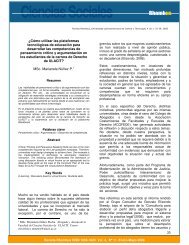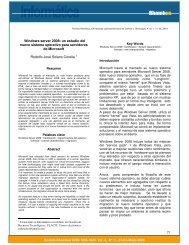IV Edición Revista Derecho en Sociedad - Ulacit
IV Edición Revista Derecho en Sociedad - Ulacit
IV Edición Revista Derecho en Sociedad - Ulacit
Create successful ePaper yourself
Turn your PDF publications into a flip-book with our unique Google optimized e-Paper software.
DERECHO EN SOCIEDAD, N. º 4 . Enero del 2013<br />
<strong>Revista</strong> electrónica de la Facultad de <strong>Derecho</strong>, ULACIT – Costa Rica<br />
constitution of the Arbitral Tribunal. The previous work, in order to consider the important <br />
and relevant factors for the proper constitution of the Arbitral Tribunal that will have the <br />
mission of r<strong>en</strong>dering a valid and <strong>en</strong>forceable award. <br />
It is important to keep in mind that the constitution of an Arbitral Tribunal that is not in <br />
accordance with the parties agreem<strong>en</strong>t, will result in the chall<strong>en</strong>ge of the award, or the <br />
rejection of recognition and <strong>en</strong>forcem<strong>en</strong>t, according to Article V of the New York <br />
Conv<strong>en</strong>tion, And Articles 34 and 36 of the Model Law. <br />
Institutional or AD-‐HOC? <br />
Wh<strong>en</strong> parties select an arbitral institution to administer the arbitration proceedings, it is to <br />
be understood that it is an institutional arbitration, and where parties have not selected <br />
one, is to be understood that it deals with an ad hoc arbitration. <br />
Arbitration Institutes have their own body of rules, with the procedures already <br />
determined, liberating parties from the hard work of creating the set of rules that will rule <br />
the arbitral procedures of their ev<strong>en</strong>tual or actual disputes. Multiple advantages of <br />
selecting an Institution in running the administration of the proceedings are to be noted: <br />
the main refer<strong>en</strong>ce will be that it gives the extra confid<strong>en</strong>ce that a specialized group of <br />
individuals, in arbitration, will take care that the proceedings run smoothly. Another <br />
perceived b<strong>en</strong>eficial factor is the help that Institutions can give to practitioners in <br />
complicated proceedings such as the chall<strong>en</strong>ge of an arbitrator 21 . And a final, non-exhaustive,<br />
advantage could be the quality seal (dep<strong>en</strong>ding of the institution) that is giv<strong>en</strong> <br />
to the process of selecting arbitrators, since it is usual that the candidates for becoming <br />
21 Chall<strong>en</strong>ge proceedings in Institutional Arbitrations are to be resolved by the organ that is the head of the <br />
arbitral institution, giving a transpar<strong>en</strong>t and already determined proceeding to follow for the parties. In <br />
contrast with the method followed. E.g. Art. 11 of the Rules of Arbitration of the International Court of <br />
Arbitration of the International Chamber of Commerce (1998), hereinafter ‘ICC’; Art. 15 of the Arbitration <br />
Rules of the Arbitration Institute of the Stockholm Chamber of Commerce, hereinafter, ‘ SCC rules’. <br />
79


